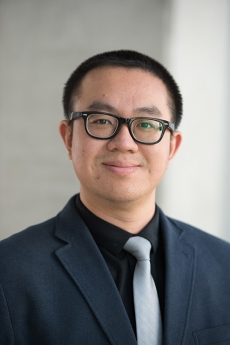From electrospun nanofibrous air filters to a new nanomaterial that can enhance disinfectants, Civil and Environmental Engineering Professor Danmeng Shuai has been working tirelessly to address pressing global challenges such as the Covid-19 pandemic. Shuai’s pioneering research recently won him a Frontier Research Award from the Association of Chinese American Professors in Environmental Engineering and Science (CAPEES)!
CAPEES is a nonprofit that promotes knowledge and ideas in the field of environmental engineering and science (EES), fosters professional growth of the large community of Chinese American professors in EES, and provides expert scientific and technical services to the EES community and society at large. Due to his interest in advancing the knowledge of EES and promoting the visibility of Chinese Scholars, Shuai decided to become a member of CAPEES as they hold goals.
Their annual Frontier Research Award was awarded to two highly-qualified candidates this year, who each received a cash award of $500. The award is meant to recognize an outstanding tenured or tenure-track professor who is considered a pioneer in a research area of EES with original and widely recognized contributions. Shuai fits this description as he consistently produces exciting, groundbreaking research that leverages nanotechnology and catalysis to protect public health by controlling environmental pathogens.
Over the past seven years, Shuai and his research team have developed a series of photocatalysts, single-atom and double-atom catalysts, and electrospun nanofibrous membranes, each of which has performed excellently in removing biofilms, capturing coronavirus aerosols, and inactivating coronaviruses. His research has been published in numerous academic journals such as Environmental Science & Technology, Journal of Hazardous Materials, and ACS Environmental.
“Receiving this award means a lot to me. When I look at past awardees, they are well-known professors in their fields and I’m very proud to be one of them. I greatly appreciate the recognition of this award and I will continue with my cool research projects,” Shuai stated.
A “cool” research project his team is currently working on includes developing enzyme-mimicking catalysts that can utilize readily available oxygen gas for environmental pathogen inactivation. They are also looking at the environmental behavior of an emerging pathogen, vesicle-cloaked virus clusters, to understand how to control this pathogen. In short, Shuai says they are particularly interested in discovering and understanding new pathogens and leveraging engineering tools to kill them.
Shuai will receive the plaque commemorating this award at the upcoming Association of Environmental Engineering and Science Professors (AEESP) Research & Education Conference. The theme of this year’s conference is “Responding Together to Global Challenges” because it is designed to reflect the many contributions of EES professionals in addressing pressing global issues, like emerging environmental pathogens, in order to create a healthier society.
“Environmental pathogens are everywhere, and they pose serious health risks; think about the COVID-19 pandemic,” Shaui said. “We are proud to provide engineering solutions to protect public health and improve the quality of life.”


